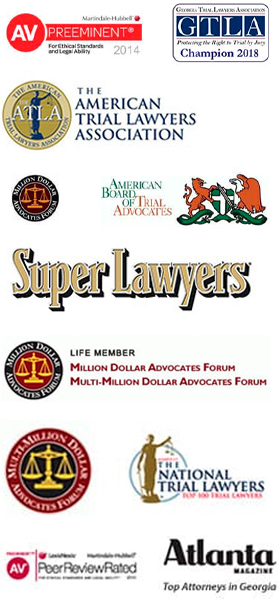Determining Negligence in Personal Injury Cases
Negligence is the primary legal principle upon which most personal injury claims are built. Negligence is the failure of a person or business to use reasonable care to prevent injury to another.
To recover compensation due to negligence in Georgia, the plaintiff must prove multiple elements of their case including Duty, Breach, Causation, and Damages.
Duty
Duty is the responsibility we have as individuals to act reasonably to protect ourselves and others. This may be phrased as a standard of care in some industries. This would be shown by a dog owner keeping their dog, which they know to have a biting problem on a leash at all times and perhaps even a muzzle on their mouth.
Breach
Breach is the action that the defendant does that falls below that duty. This may be the dog owner allowing their pet that they know is dangerous to run off leash, resulting in a bite wound.
Causation
Causation ties the breach to the injury. Attorney’s often use the phrase “But for” to show that the plaintiff would not have been injured had the defendant not breached their duty. To think about our dog bite example, a plaintiff would not suffer injuries associated with the bite if the defendant had taken appropriate care to leash the dog.
Damages
Damages are the harm that the plaintiff suffers. This can include a variety of things including physical injuries, emotional distress, medical bills and lost wages.
But there is another legal principle that personal injury plaintiffs should understand before filing claims and how damages are rewarded in Georgia: Comparative fault and the law of modified comparative negligence.
Application of Modified Comparative Fault in Georgia
A significant part of the damages portion of personal injury law is determining how much the defendant is at fault. The idea is that those legally responsible for actions that causes the injury should pay their fair share – but nothing more. A person can be held comparatively at-fault for either causing an accident or exacerbating their own injuries. There are multiple methods to divide fault in an injury case.
Comparative Negligence (Non-Georgia Cases)
Some states use a method known as comparative negligence, which simply states that if the plaintiff shares in a percentage of fault, their award will be reduced by that percentage, even if the plaintiff is determined to be 99%.
Modified Comparative Fault in Georgia
Under Georgia law (O.C.G.A. § 51-12-33), an injured person may have their damages award reduced by the percentage of fault that they contributed to the claim up to 50%. Modified comparative fault allows a jury to apportion a degree of fault to the person who was injured leading to the court to reduce the amount of damages awarded. This means if the injured party is 50% or more at fault, then they are not entitled to recover compensation. It also means if the injured party is less than 50% percent at fault, then they are entitled to recover damages.
At trial, a judge will not only ask the jury to determine how much money your injuries are worth, they will also ask the jury to determine a percentage of that amount that you, the plaintiff, should get. A jury will be asked to look at all the facts of your case to determine how much everyone at fault should pay. Some of these arguments will be brought up by the defendant throughout a trial. Arguments such as the plaintiff’s violation of a law, third party’s behavior and assumption of the risk are commonly used to attempt to shift fault away from the defendant and their negligence.
Being prepared to fight these defenses by seeking representation from an Atlanta Personal Injury Attorney is a key to ensuring that you are prepared for trial.
Examples of Comparative Fault Judgements in Georgia
Comparative fault can be found in most injury cases, including auto accidents, premises liability, dog bites, trucking accidents, and boating accidents. Some examples of comparative fault in Georgia might include:
Modified Comparative Fault in Car Accident Injury Cases
If Driver A turns left in front of Driver B at an intersection without the right of way and they cause a crash, Driver A may be deemed legally responsible to cover Driver B’s damages. However, if Driver B was speeding and this contributed to the occurrence of the crash or the severity of resulting injuries, Driver B could also be found liable. If Driver B’s total damages are $100,000, but the jury finds Driver B is 30 percent comparatively liable, the court will reduce Driver B’s total damages to $70,000.
Modified Comparative Fault in Truck Accident Injury Cases
A driver is struck and killed by a fatigued trucker who fell asleep at the wheel on the highway. His estate files a wrongful death lawsuit against numerous parties, including the driver, carrier and shipping company. Defendants assert the crash wouldn’t have happened if decedent hadn’t been driving drunk at the time of the crash. The jury finds decedent was 51 percent liable for the crash. His estate will not be able to collect damages from the wrongful death claim defendants.
Modified Comparative Fault in Slip-and-Fall Cases
A restaurant patron slips and falls on wet flooring. The plaintiff sues the restaurant with a premises liability claim. The defendant, however, argues the plaintiff was partially at fault because he was distracted by his smartphone when he slipped. A jury might find the plaintiff 10 percent at fault and the restaurant 90 percent at fault. If the total damage award is $40,000, the amount the plaintiff actually receives will be $36,000 – the total damage award, minus 10 percent.
Modified Comparative Fault in Negligent Security Cases
In more complicated and often tragic scenarios, a property owner may not take proper steps to secure a property. This often occurs in common areas of apartment complexes such as parking lots and community spaces. If an apartment complex is in a dangerous area, they will be required to take certain steps to protect renters. This may be exemplified by having security guards, cameras and gates to discourage and prevent crime.
If a resident is harmed by a criminal on the property, the property owner will likely try to shift some level of blame onto the criminal, who will not be able to pay you the damages awarded by the court. Showing that the complex did not take those reasonable steps will help to protect you will ensure that you are able to get the maximum award for the damages you suffer.
Limit Liability in a Georgia Injury Lawsuits
Because a finding of modified comparative fault in Georgia can substantially lower or even eliminate the amount of damages you can recover in a personal injury lawsuit, it’s imperative to hire an Atlanta injury attorney who will work to maximize your chances of full and fair compensation. A good lawyer can do this by working diligently to help you gather evidence, build a strong case and prepare for challenges from insurers and other defendants.
The foregoing answers are not legal advice and are merely a general overview. You are advised to consult a lawyer to address your specific situation. For more information or to inquire about a free consultation, contact Stephen D. Apolinsky, an experienced Atlanta injury attorney, at Apolinsky & Associates at (404) 377-9191 or email him at steve@aa-legal.com.



